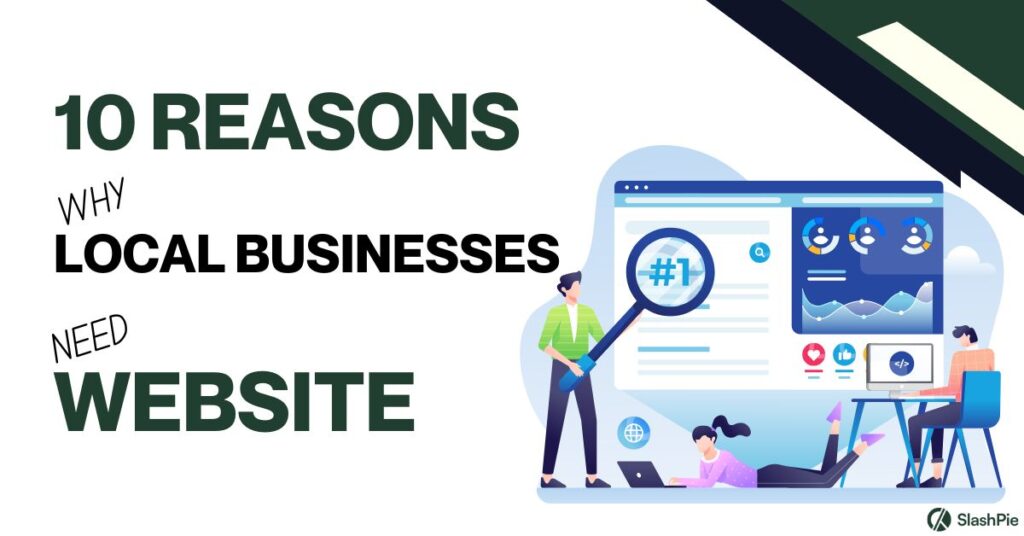The world has gone digital, and people are searching online for everything they need. Google processes 3.5 billion searches per day, which means 40,000 searches per second.
Are you a small business owner and don’t have a website? You’re missing out on a huge opportunity. Today, having a solid online presence isn’t optional—your customers expect it.
It doesn’t matter if you’re selling products, offering services, or just showcasing your expertise, a website opens doors to numerous opportunities.
Here we’ll discuss the top 10 reasons why local businesses need a website and how it can unlock your business’s full potential.
Social Media Isn’t Enough To Replace A Website
Over 5.17 billion people actively use social media worldwide. It might seem like a no-brainer for businesses to focus solely on social media platforms like Facebook and Instagram.
But did you know that 75% of consumers judge a company’s credibility based on its website? So, is social media enough to replace a website?
Let’s compare both and see why having a website still matters.
| Aspect | Social Media | Website |
| Control | Limited by platform rule and updates | Full control over design, content, and functionality |
| Credibility | Can appear less professional | Increases trust and credibility |
| Customization | Restricted customization options | Unlimited customization and branding |
| Analytics | Basic insights provided by platforms | In-depth tracking of visitor behavior |
| Reach | Depends on platform algorithms | Organic and direct traffic sources |
| Sales | Limited e-commerce features | Full e-commerce functionality |
| Longevity | Subject to platform change or closure | Stable and permanent presence |
Social media provides instant engagement. But it lacks the full control, customization, and long-term benefits that a dedicated website offers.
Key Reasons Why Small Businesses Need A Website
Don’t have a website for your business? Well, you’re leaving money on your table. You’re also damaging growth and losing credibility. Here are 10 reasons you need a website today:
1. Lets People Know Your Business Exists
Word of mouth and referrals help, but without a website, you’re missing out on many potential customers. People can’t easily find your business if it’s not online.
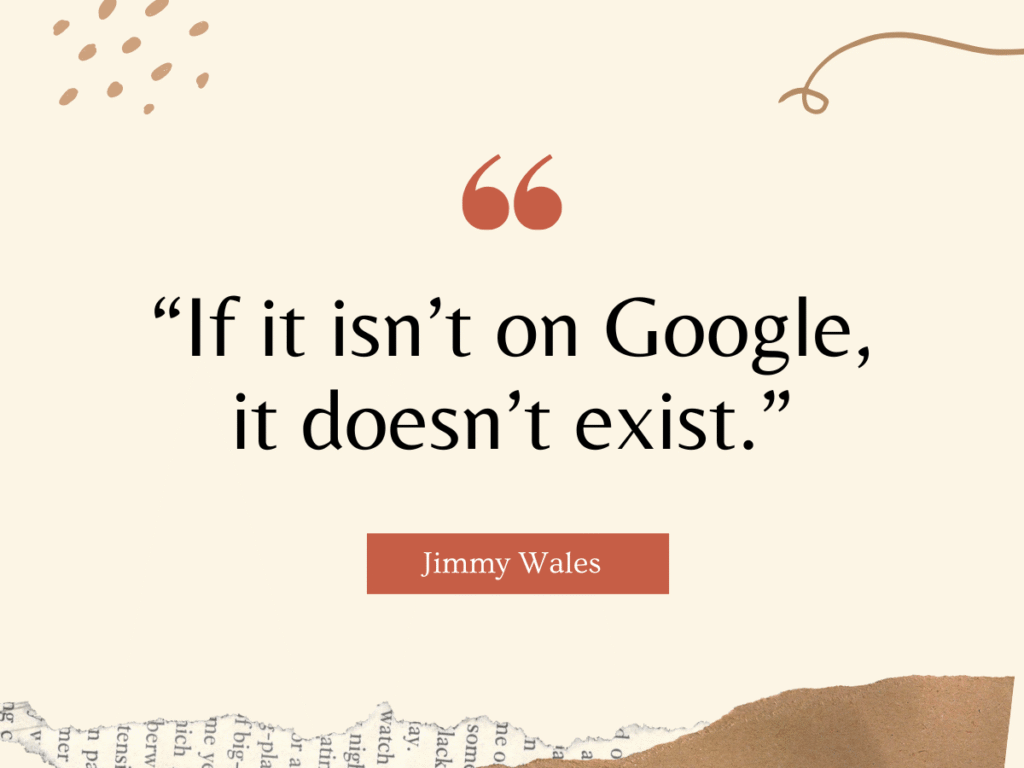
With a website, search engines like Google can index your content. Thus, people can easily discover you. Wikipedia founder Jimmy Wales said, “If it isn’t on Google, it doesn’t exist.”
Blogging can boost this even more. HubSpot notes that businesses with blogs get 67% more leads than those without one.
2. Provides Valuable Social Proof for Your Business
Your website provides the social proof that your business is legitimate. Without one, how will people know you’re not just working from a basement?
A website establishes credibility and shows you are serious. It reassures potential customers that you’re trustworthy.
If you had to choose, you’d likely trust a business with a website over one without. Investing in a website builds that essential trust.
3. Gives You Full Control of Your Brand Image
Your website is your digital headquarter, and it say about your business. It gives you full control over your brand and how you sell your products.
Natalie Sequera said, “If you have a website; it makes your small business look big. This means a website changes your brand image.
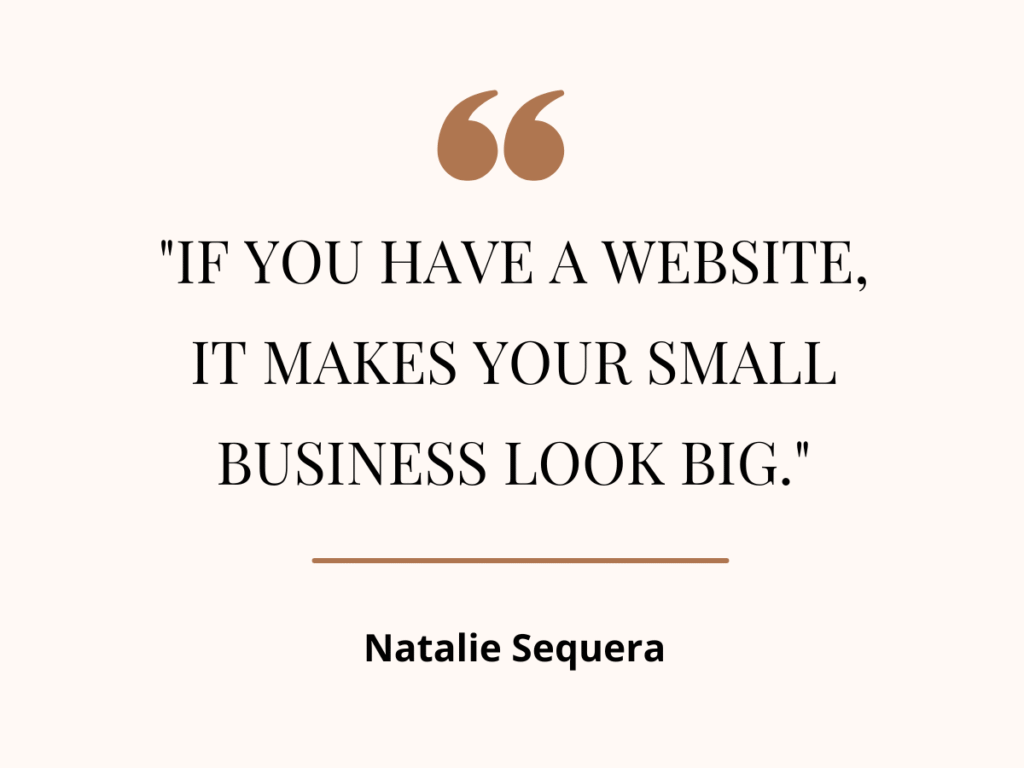
Don’t rely too much on other platforms like Facebook. If something goes wrong there, you might lose everything. We have seen this happen to many. It’s a big risk!
A website takes work, but it’s worth it. Here’s why:
- No fees: You keep all the profits.
- Set your own rules: Control your pricing and marketing strategy.
- No more social media drama: Avoid the risks of platform changes or censorship.
- More data: Google Analytics and Search Console give you insights.
- Less selling, more results: Your website does most of the work for you.
- Boost your brand’s visibility: More people will find you online.
- Build stronger relationships: Connect with clients directly on your website.
So, move to your own website, design it in the best possible way, and take control of your business!
4. Strengthens Your Business’s Credibility
In the past, companies relied on TV ads or billboards for credibility. Today, customers research businesses online before buying, making a website essential.
Website acts as a virtual business card. It’s often the first thing potential customers see. A well-designed, professional website builds trust,
On the contrary, an outdated one signals a lack of professionalism. Including helpful information, testimonials, and reviews further enhances credibility.
In a world where over 50% of people find new businesses via smartphone searches, having a robust website is crucial.
5. Maximizes Your ROI
Running a business? You probably want to get the most out of your money. A website can help! Amit Kalantri said, “a website can make money for you while you are asleep.”
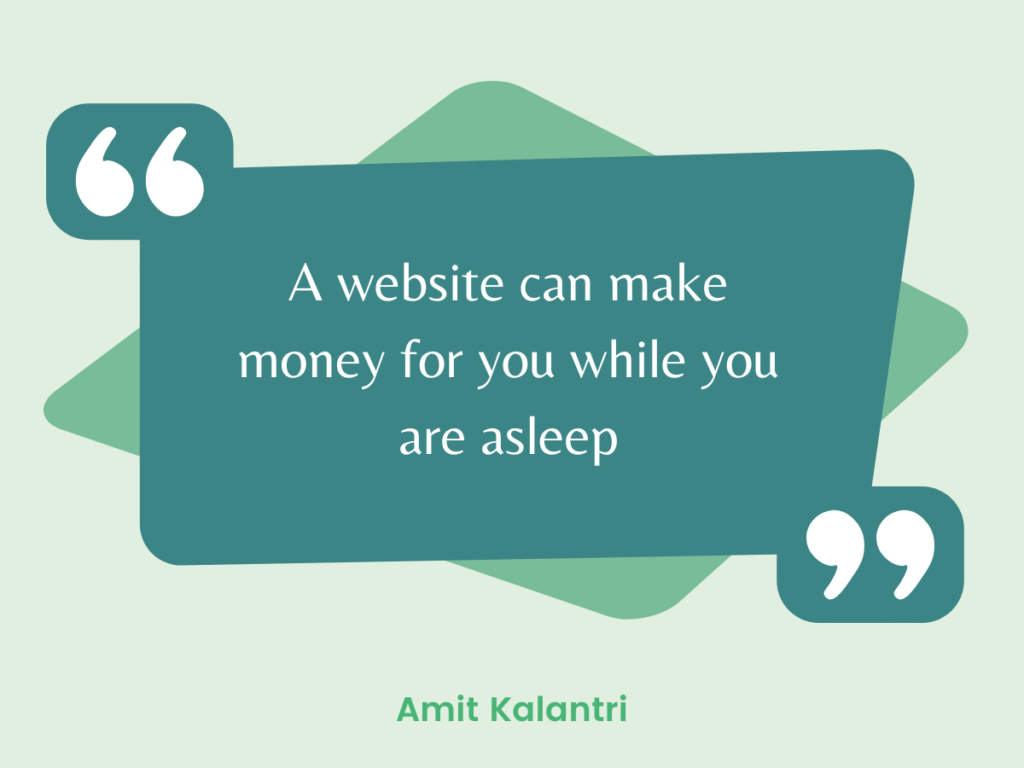
A well-designed website can significantly boost your return on investment (ROI). Here’s how:
Targeted Design:
What do your ideal customers want to see? What makes them stay on your site? Design your website to attract and keep them coming back.
SEO Investment:
SEO helps your website rank high in search engines. Higher ranking means more people see your site! More website traffic equals more potential customers.
Clear CTAs (Call To Action):
Use CTAs to tell visitors what you want them to do. Want them to sign up for your email list? Include a CTA that says “Click here to subscribe.” Make CTAs clear and easy to find.
These tips will make your website a money-making machine! A smart, optimized website helps you grow your business without spending a fortune.
6. Extends Your Reach Beyond the Local Area
Lets say your business is confined to a local area. With a website, you’re not just limited to your city or town!
Your online presence extends your reach to potential customers all over the world. Instead of relying only on foot traffic, you can attract customers from anywhere.
People searching for products or services like yours can find you online, even if they’re across the country or in another city.
It broadens your business’s reach and helps you tap into new markets without the limits of geographical location.
7. Helps You Compete Against Industry Giants
In the mid 90s, Bill Gates stated that, “If your business is not on the internet, then your business will be out of business.” At that time, it was a tongue twister, but now we can relate to this.
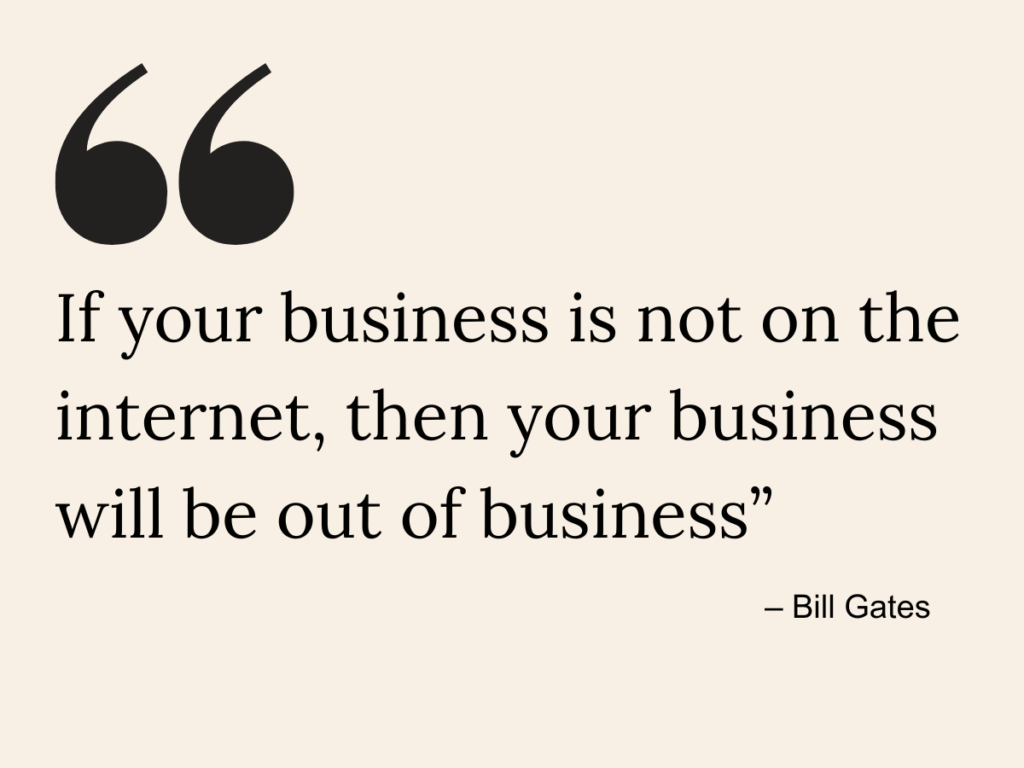
Without a website your business is non-existent, let alone competing with the goliaths. Having a website levels the playing field, even against industry giants.
If you have a well-optimized website, you can reach the right audience at the right time, no matter how much bigger your competitors are.
Ranking high on search engines like Google means your business is visible to potential customers who start their journey with online research.
A strong online presence lets you compete, gain trust, and drive sales, even in a crowded market. Without it, you risk losing customers to larger competitors who dominate search results.
8. Showcases Your Offers to Potential Customers
A website is often the first point of contact for potential customers. Your website gives full control over how your business is presented.
You can highlight your products or services in a way that appeals to your audience. This means you can shape their perception right from the start.
Prominently feature product details, images, and benefits. Website allows visitors to explore your offerings in a clear and engaging way.
Add calls to action to drive leads and sales. Whether it’s “Request a Quote” or “Buy Now,” these actions direct your visitors toward making a purchase or inquiry.
For an enhanced experience, use additional features like product videos, downloadable guides, or customer stories to deepen engagement.
9. Keeps Your Business Open 24/7
Your website does more than just showcase your business. “Websites promote you 24/7: no employee will do that” – said by Paul Cookson.
It actively encourages potential clients to reach out or make a purchase. Since your site is always available, it can handle inquiries, bookings, and orders around the clock.
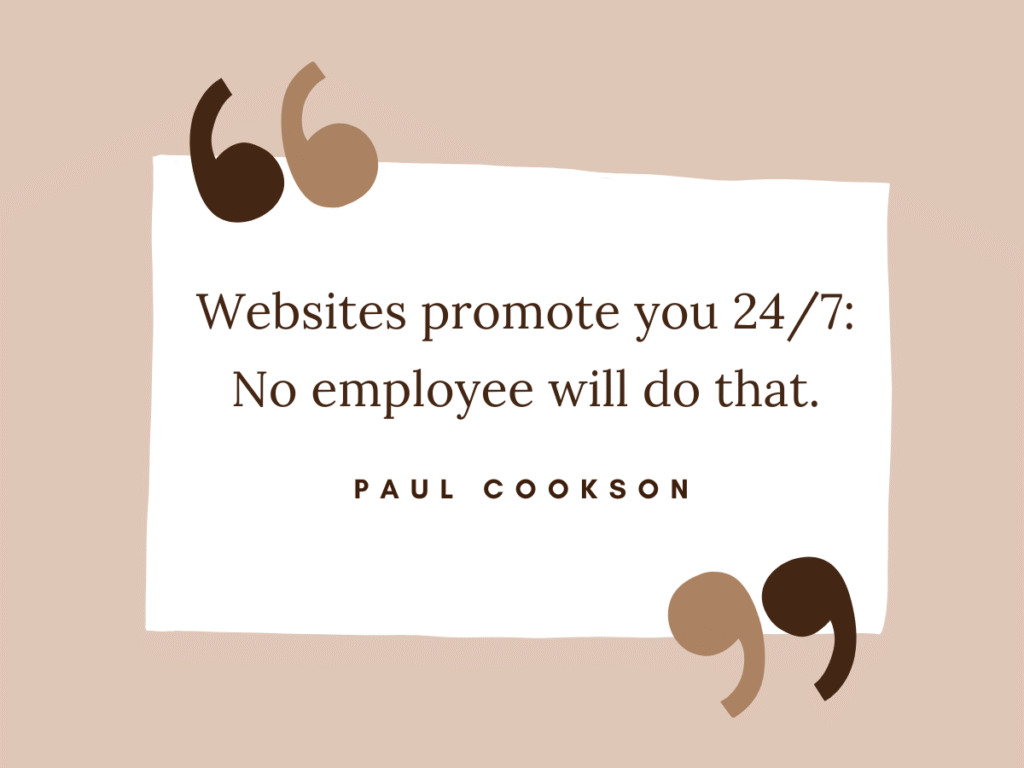
Here are some tips to turn your website into 24/7 on-demand CSR:
- Add FAQs: Answer common questions upfront. Add product-specific FAQs with pricing and details right on the product page, so users don’t leave before making a decision.
- Use an Announcement Bar: Place time-sensitive updates in a visible bar at the top of your site with a link for more information.
- Add Location Info: If you have a physical location, make it easy to find by adding a location page or placing your address in the footer.
- Integrate Scheduling: Use an online scheduler with an intake form and, if applicable, offer easy payment options at the time of booking.
With clear communication and automation, your website can act as a reliable, on-demand assistant that keeps customers informed and ready to buy.
10. Tracks Data and Measures Success
One big advantage of having a website is the ability to track and measure data. Tools like Google Analytics provide insights into how your website is performing. You can see:
- How many people visit your website
- Which pages are popular
- Where your visitors are coming from
This data helps you understand what’s working and where improvements are needed. Know which pages engage visitors and which don’t to refine your marketing strategies.
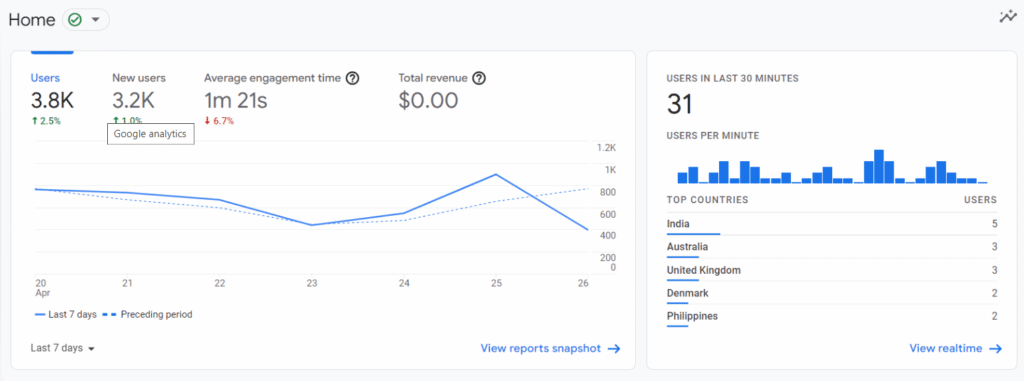
For example, if you notice that a blog post attracts a lot of visitors, you might create more content on similar topics.
Google Analytics also offers funnel tracking. Here you can see how visitors move through your website. It helps you identify effective pages or spot areas that need tweaking.
And with the latest updates, Google’s natural language reporting makes it even easier. Just type a question, and you’ll get an analytics report in plain language.
With the right data, you can continually optimize your website for better performance. It’s a simple yet powerful way to improve your business’s online success.
FAQs
Do I need a business website if I’m active on social media?
Yes, a website is still essential, even with an active social media presence. A website offers more control over your branding and content.
It helps build trust and credibility and provides a platform for direct customer engagement without the restrictions of social media algorithms.
While social media is valuable, it doesn’t offer the same professional authority as a well-designed website.
What do users generally look for in a website?
Users expect simplicity, functionality, and a clean design. They want a user-friendly experience with intuitive navigation, quick loading times, and valuable content.
Trustworthiness is key; clear calls-to-action, relevant information, and responsive design all contribute to keeping visitors engaged and satisfied.
How do I start a small business website easily?
Starting a small business website is simple with popular website building platforms like WordPress. Here’s how:
- Choose a domain name: Pick something memorable like www.yourbusiness.com.
- Set up hosting: This is where your website files are stored.
- Install WordPress: Most hosting platforms offer easy, one-click installation.
- Customize it: Use themes and plugins to create the look and functionality you need.
Within minutes, you can have your small business website live! It’s totally free to build a website with WordPress.
Final Words
A website is like a digital business card, but it can be much more. It introduces your business, showcases your services, and highlights why customers should choose you over competitors.
The reasons above illustrate why a website is crucial in 2024. No matter your business size, an online presence is essential to stay competitive and attract new customers.
Create your website, and make sure it is live and optimized. So your business can thrive online and stay ahead of the competition.
